Community
Copyright@ Australian Catholic University 1998-2026 | ABN 15 050 192 660 CRICOS registered provider: 00004G | PRV12008
Copyright@ Australian Catholic University 1998-2026 | ABN 15 050 192 660 CRICOS registered provider: 00004G | PRV12008
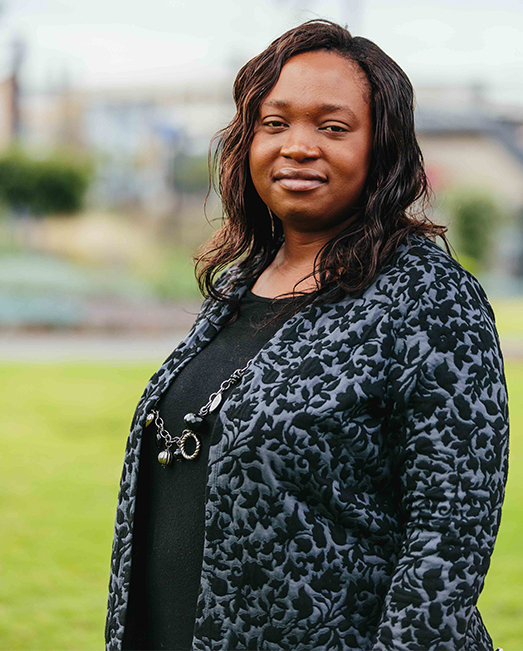
Abiola Ajetomobi was forced to leave her home in Africa for a new life in Melbourne, arriving with limited English and a high school certificate. Now, this former refugee has completed multiple university courses and is a leader in her community, working to help others seeking asylum find their rightful place in Australia – and a new sense of home.
In spite of everything’s she’s learnt since she first arrived in Australia as an asylum seeker in 2008, Abiola admits free time is something she knows little about. Instead, this year’s winner of the inaugural Entrepreneurship, Leadership and Innovation Alumni Award has been incredibly busy for the past 12 years, and is in the process of completing her sixth professional education course, which includes four university qualifications.
“Learning is addictive for me! Every year I try to do something, even if it’s just a two-week course. The way I see it is I owe society to be the best me I can be.
"So, I’m constantly exploring more and more so I can be of value. I always think next year I’ll do things differently and reduce my commitments, but if I’m being honest, usually I just end up adding more.
“Right now, I’m in the middle of a leadership and executive program at the Melbourne Business School that I actually first read about on LinkedIn on Christmas Day. What was I even doing on LinkedIn at Christmas? I have no idea!”
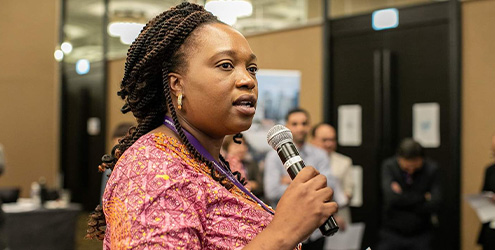
Abiola knows she has come a long way from when she first arrived in Australia with a young family in tow.
“We came here by default. It was all about safety, stability and creating peace for my family. When you’re in crisis in a highly volatile environment, fighting for your life, you are just looking for somewhere that you can breathe.”
Abiola said adapting to her new life in Melbourne was a slow process.
“It took me a good three to four years to internalise why I was here. It wasn’t something we chose, and once we got to Australia we began to understand we couldn’t go back.
“At the time I wasn’t thinking about the future, only the now. I knew it was an opportunity to restart my life again. But I thought, what does that even look like?”
It didn’t help that the family got off to a rocky start. Five days after arriving, Abiola’s daughter was rushed to hospital with a badly broken foot on the family’s first city outing.
“It destabilised everything. We didn’t have Medicare yet, and the hospital had to call the Red Cross to work out how to help us.”
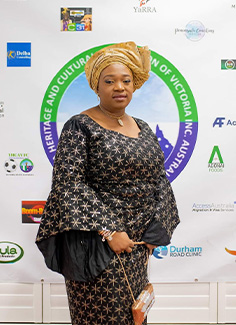
With time, and help from a local family, Abiola started to find her way.
“The family we met helped us see that Australia is a land of opportunities if you open yourself up to it. They said you can do this, you can explore. I thought, ‘Wow! So, I’m allowed to start thinking this way?’”
Improving her English was Abiola’s first goal and one of the hardest hurdles to overcome.
“I had to apply for a fee-waiver at TAFE as I couldn’t afford it and I was living a two-hour bus ride from the campus that I had to get to five days a week. But that’s how it started.”
After her English studies, Abiola gained a business degree, working at night in an aged care home so she could study during the day. She then got a temporary job at a local TAFE in client services before moving into her first managerial role in a crisis relief centre, “but not because I applied.”
Abiola’s unexpected job offer came about when she met the mother of a sick child in her mother’s group.
“I was trying to organise a fundraiser to help her family. We’d only just met, so she was very surprised I was offering. But I said no, I feel your pain, I want to do this.
“I met with the pastor of her church where I was hoping to host the fundraiser and I explained my idea to him and what it meant to me to help this family. Instead of agreeing to the event, he just looked at me strangely and said, ‘Will you work for me?’.
“His manager had resigned and he thought I was right for the role. I immediately said ‘No, I’ve never had a managerial role in Australia, people say my English isn’t good enough, I can’t manage anyone. No, no, no.’ However, when I was invited back and saw the women in distress and the compassion resonating through the centre, I didn’t leave till 7.30pm that night and I started working there the next day.”
It was through this job that Abiola found her way to ACU to study a Graduate Certificate in Management of Not-for-Profit Organisations.
“I realised I had big knowledge gaps and little understanding of not-for-profits in Australia, and I needed to upskill quickly. The course was perfect for me and it changed my career trajectory significantly.”
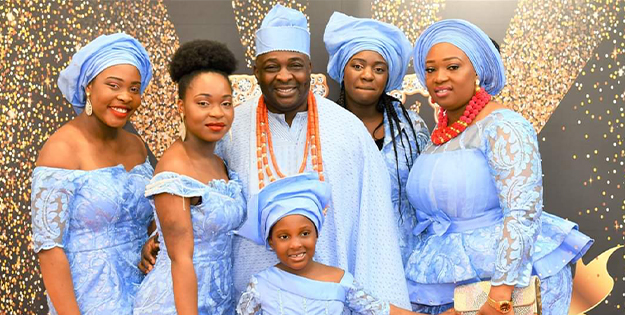
Abiola is now the director of the Innovation Hub at the Australian Asylum Seekers Resource Centre, where she works to empower people seeking asylum in the hope of instigating long-term social change.
“This job is a privilege. I think working in this sector is my calling; it’s very demanding, but it’s a call to action. I just can’t afford to ignore injustice anymore.
"As a former asylum seeker myself, it affects me deeply to think others haven’t had the same opportunities and access to resources like I’ve had. If they receive the same help, their stories could change completely.
“And now, through my work, I never sit in front of a potential employer trying to sell them an ‘asylum seeker’. Instead, I’m offering them individuals who have the capability, merit and agency to contribute to an organisation – and our society.”
Abiola believes it’s important for everyone to understand the realities of how people seeking asylum made their way to Australia.
“People seeking asylum don’t choose their destination, the destination chooses them,” she said. “So, if they’re here in Australia, it’s not by accident. They just need to be given the resources to thrive so they can contribute fully to our society.
“The representation of people seeking asylum has limited our ability to see them as humans. But those things you wish for yourself? It’s ok to wish that for other people too.
"The current representation of refugees is dehumanising; we see them as a burden to carry. But they can do so much more. I know because I’ve met some incredible people, read some of their resumes and told them, ‘Actually, you know what, you could seriously do my job’. They have so many skills to offer. And the reality is many people have nowhere to go back to and this is home for them.”
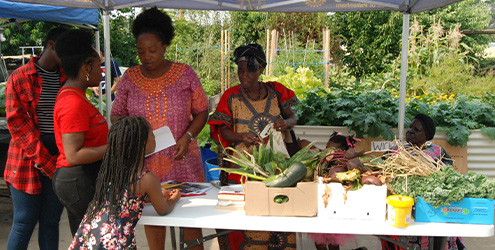
In between her demanding work schedule and never-ending university study, Abiola has still found time to volunteer.
“The Joyway Widows Foundation was started by a friend who was thinking about widows without children in a country like Nigeria where people often don’t have access to social security or support. If people don’t have children, who’s going to look after them? They get forgotten.
“The foundation works to provide these women with financial resources and empowerment opportunities.
"I know education is key in life – if you can be trained, you can do; if you can be taught, you can perform.
"So, we try to develop their employability and we link the older women to hospitals for extra support. It’s still very micro, but it’s making a big impact.”
Another organisation Abiola lends her time to is United African Farms, which is using food to engage the African community.
“People think of Africa as being like one country, but there are so many of us and we’re all different. This was an opportunity to find common ground using farming, food sovereignty and healthy eating as our focus, and it’s a knowledge sharing space for our youth too.”
Nigeria will always be a part of Abiola’s story, and her heart.
“When we arrived in this country, we didn’t think we’d return. But since I started working in the social innovation space and in leadership, I always get drawn back to my country, my culture and my community. I think about how much more can I do to help.
“And I do play with the idea of maybe going back to Nigeria to help with capacity building – they need to learn to respond to their own issues rather than waiting for developed countries like Australia to step in.
“However, is Australia home? All the struggles I’ve been through helped me overcome the challenges I’ve experienced here. So, Australia is home, but my motherland is home too. I have a deep sense of gratitude and Australia helps me appreciate the acceleration that’s happened in the past 12 years for my family.
“Though sometimes I wish I had started working on my dreams earlier. This wasn’t anyone’s doing, just my own confidence and feeling like I couldn’t contribute. If I’d had the same sense of agency and confidence I have now, I wonder what I could have achieved sooner? I wish I knew then to believe in myself and push through. But everything I’ve done is based on opportunities. I’m just so grateful for what I have.”
Abiola was awarded the inaugural Entrepreneurship, Leadership and Innovation Alumni Award.
Copyright@ Australian Catholic University 1998-2026 | ABN 15 050 192 660 CRICOS registered provider: 00004G | PRV12008